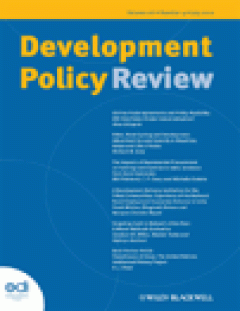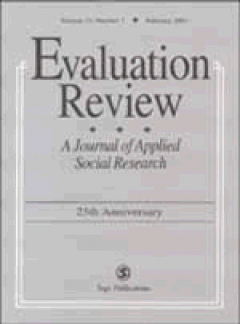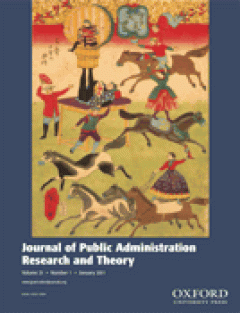Filter by

Global Anti-Money Laundering Standards and Developing Economies : The Regulat…
This article discusses the confluence of international initiatives to counter money laundering and terrorist finance with migrant remittances and the growing use of mobile telephone technology for more than making a call. The experiences of Kenya and the Philippines with mobile telephone-based financial services are outlined as potential models consistent with the ‘risk-based’ approach now prom…
- Edition
- Volume 29, Issue 4, July 2011, pages 415–431
- ISBN/ISSN
- 09506764
- Collation
- -
- Series Title
- Development Policy Review
- Call Number
- -

The Politics of Investment and Growth in Egypt : Experimenting with a New App…
‘Improve the investment climate!’ is the dominant advice for governments wishing to achieve substantial increases in productive private investment. However, national-level investment-climate approaches have been criticised for not paying adequate attention to context and feasibility. This article experiments with a new approach which focuses on sectors and on relationships between policy-makers…
- Edition
- Volume 29, Issue 4, July 2011, pages 433–458
- ISBN/ISSN
- 09506764
- Collation
- -
- Series Title
- Development Policy Review
- Call Number
- -

Immanent and Interventionist Inland Asian Aquaculture Development and its Out…
Aquaculture is equated with the reduction of poverty by intergovernmental agencies such as the FAO, which advocate the promotion of small-scale aquaculture through project-based interventions. There is a lack of convincing empirical evidence to support the efficacy of this type of intervention, however. Meanwhile, commercial cultured freshwater fish production has increased hugely throughout As…
- Edition
- Volume 29, Issue 4, July 2011, pages 459–484
- ISBN/ISSN
- 09506764
- Collation
- -
- Series Title
- Development Policy Review
- Call Number
- -

Access to Water in the Slums of Sub-Saharan Africa
This article reviews the changing perspectives for improving access to water in the slums of developing countries, especially in sub-Saharan Africa. While much of the literature continues to maintain an aversion to state-led urban development policies, there is now increasing emphasis on the importance of informal, small-scale providers and communitarian initiatives, following the many failures…
- Edition
- Volume 29, Issue 4, July 2011, pages 485–505
- ISBN/ISSN
- 09506764
- Collation
- -
- Series Title
- Development Policy Review
- Call Number
- -

The Role of Need for Contraception in the Evaluation of Interventions to Impr…
A nonrandomized experiment carried out in Jharkhand, India, shows how the effects of interventions designed to improve access to family-planning methods can be erroneously regarded as trivial when contraceptive use is utilized as dependent variable, ignoring women’s need for contraception. Significant effects of the intervention were observed on met need (i.e., contraceptive use by women who ne…
- Edition
- Vol. 35 no. 1, February 2011.pp. 3-13
- ISBN/ISSN
- 0193841X
- Collation
- -
- Series Title
- Evaluation Review
- Call Number
- -

Multimethod Strategy for Assessing Program Fidelity : The National Evaluation…
This study reports the results of the process evaluation component of the Process and Outcome Evaluation of the Gang Resistance Education and Training (G.R.E.A.T.) program. The process evaluation consisted of multiple methods to assess program fidelity: (a) observations of G.R.E.A.T. Officer Trainings (G.O.T); (b) surveys and interviews of G.R.E.A.T.-trained officers and supervisors; (c) survey…
- Edition
- Vol. 35 no. 1, February 2011.pp. 14-39
- ISBN/ISSN
- 0193841x
- Collation
- -
- Series Title
- Evaluation Review
- Call Number
- -

An Experiment to Test the Feasibility and Quality of a Web-Based Questionnair…
The use of web-based surveys to gather information from teachers has become increasingly common primarily based on the premise that they can reduce costs. Yet, relatively, little is known about the quality or cost effectiveness of web-based versus mail surveys for teachers. To study the efficacy of web-based teacher surveys, the author randomly assigned a nationally representative sample of 877…
- Edition
- Vol. 35 no. 1, February 2011.pp. 40-70
- ISBN/ISSN
- 0193841x
- Collation
- -
- Series Title
- Evaluation Review
- Call Number
- -

How Consistent Are Class Size Effects?
Thus far researchers have focused on computing average differences in student achievement between smaller and larger classes. In this study, the author focus on the distribution of the small class effects at the school level and compute the inconsistency of the small class effects across schools. The author use data from Project STAR to estimate small class effects for each school on mathematic…
- Edition
- Vol. 35 no. 1, February 2011.pp. 71-92
- ISBN/ISSN
- 0193841x
- Collation
- -
- Series Title
- Evaluation Review
- Call Number
- -

The Effect of a College Pen Incentive on Survey Response Rate Among Recent Co…
Incentives have shown a variable effect in improving survey response rates, but the effect of a pen from an organization to which the respondent has loyalty has not been studied. Recent college graduates were randomized to receive or not receive a college logo pen accompanying an initial survey mailing. Among 119 total respondents, there were no differences in response rate to the initial maili…
- Edition
- Vol. 35 no. 1, February 2011.pp. 93-99
- ISBN/ISSN
- 0193841x
- Collation
- -
- Series Title
- Evaluation Review
- Call Number
- -

Aftershocks of Chile’s Earthquake for an Ongoing, Large-Scale Experimental …
Evaluation designs for social programs are developed assuming minimal or no disruption from external shocks, such as natural disasters. This is because extremely rare shocks may not make it worthwhile to account for them in the design. Among extreme shocks is the 2010 Chile earthquake. Un Buen Comienzo (UBC), an ongoing early childhood program in Chile, was directly affected by the earthquake. …
- Edition
- Vol. 35 no. 2, April 2011.pp. 103-117
- ISBN/ISSN
- 0193841x
- Collation
- -
- Series Title
- Evaluation Review
- Call Number
- -

Evaluating Health Outcomes of Criminal Justice Populations Using Record Linka…
Individuals in contact with the criminal justice system are a key population of concern to public health. Record linkage studies can be useful for studying health outcomes for this group, but the use of aliases complicates the process of linking records across databases. This study was undertaken to determine the impact of aliases on sensitivity and specificity of record linkage and how this af…
- Edition
- Vol. 35 no. 2, April 2011.pp. 118-128
- ISBN/ISSN
- 0193841x
- Collation
- -
- Series Title
- Evaluation Review
- Call Number
- -

Mandatory, Preferred, or Discretionary : How the Classification of Domestic V…
- Edition
- Vol. 35 no. 2, April 2011.pp. 129-152
- ISBN/ISSN
- 0193841x
- Collation
- -
- Series Title
- Evaluation Review
- Call Number
- -
- Edition
- Vol. 35 no. 2, April 2011.pp. 129-152
- ISBN/ISSN
- 0193841x
- Collation
- -
- Series Title
- Evaluation Review
- Call Number
- -

Evaluation of Free to Grow : Head Start Partnerships to Promote Substance-Fre…
Free to Grow: Head Start Partnerships to Promote Substance-free Communities (FTG) was a national initiative in which local Head Start (HS) agencies, in partnership with other community organizations, implemented a mix of evidence-based family-strengthening and community-strengthening strategies. The evaluation of FTG used a quasi-experimental design to compare 14 communities that participated i…
- Edition
- Vol. 35 no. 2, April 2011.pp. 153-188
- ISBN/ISSN
- 0193841x
- Collation
- -
- Series Title
- Evaluation Review
- Call Number
- -

The Distinction between Public, Nonprofit, and For-Profit : Revisiting the â€â€¦
In studying the characteristics that determine the public, nonprofit, and/or for-profit nature of organizations, public administration scholarship has elaborated upon the “dimensional” approach (e.g., Bozeman, Barry. 2007. Public values and public interest: Counterbalancing economic individualism. Washington, DC: Georgetown Univ. Press), to the point where it is now furnishing a rich body of th…
- Edition
- Volume 21, Number 1, January 2011.pp. 3-26
- ISBN/ISSN
- 10531858
- Collation
- -
- Series Title
- Journal of Public Administration Research and Theory
- Call Number
- -

Public Service Ethos : Developing a Generic Measure
This article conceptualizes public service ethos as a multidimensional construct and develops a framework that explains first, why individuals are motivated by this ethos (Public Service Belief); second, how they deliver public services in accordance with this ethos (Public Service Practice); and third, what ends they perceive it to endorse (Public Interest). Despite considerable interest in pu…
- Edition
- Vol. 21, Number. 1, January 2011.pp. 27-51
- ISBN/ISSN
- 10531858
- Collation
- -
- Series Title
- Journal of Public Administration Research and Theory
- Call Number
- -

Managerial Trustworthiness and Organizational Outcomes
Using data from the Federal Human Capital Survey, we demonstrate that the managerial traits of competence, integrity, and benevolence share an important common dimension that we identify as the trustworthiness of managerial leadership (TWML). Using recursive hierarchical linear models, we demonstrate that levels of TWML are strongly and positively associated with several measures of perceived o…
- Edition
- Vol. 21, No.1, January 2011.pp. 53-86
- ISBN/ISSN
- 10531858
- Collation
- -
- Series Title
- Journal of Public Administration Research and Theory
- Call Number
- -

The Publicness of Policy Environments : An Evaluation of Subprime Mortgage Le…
Previous evaluations of publicness have focused largely on organizations and organizational behavior. This analysis extends the applicability of publicness one step further, to consider the effect of the publicness of policy environments on resulting individual-level outcomes. Subprime or high-cost mortgage lending was an increasingly dominant strategy in the mid-2000s to deal with the uncertai…
- Edition
- Vol. 21, Number 1, January 2011.pp. 87-115
- ISBN/ISSN
- 10531858
- Collation
- -
- Series Title
- Journal of Public Administration Research and Theory
- Call Number
- -

Organizational Reform and Changing Ethics in Public Administration : A Case S…
Although ethics underlying public administration obviously changes over time, it remains largely unknown just how, when, or why this happens. This article presents a study on organizational reform in the system of taxation in Holland around 1748. Comparative use of Max Weber's characteristics of bureaucratization provides a historical perspective on the link between organizational reform and et…
- Edition
- Vol. 21, Number 1, January 2011.pp. 117-135
- ISBN/ISSN
- 10531858
- Collation
- -
- Series Title
- Journal of Public Administration Research and Theory
- Call Number
- -

Information, Interest Intermediaries, and Regulatory Compliance
This research examines the role of interest intermediaries in helping to promote environmental regulatory compliance with a particular focus on their activities to facilitate the sharing of regulatory information. Although it is widely accepted that the provision of regulatory information to regulatees is crucial to enhancing compliance, the ability of regulatees to take advantage of the inform…
- Edition
- Vol. 2011, Number 21, January 2011.pp. 137-157
- ISBN/ISSN
- 10531858
- Collation
- -
- Series Title
- Journal of Public Administration Research and Theory
- Call Number
- -

Representation of Lesbians and Gay Men in Federal, State, and Local Bureaucra…
Using a 5% sample of the 2000 Census, we present the first estimates of the percentages of federal, state, and local government employees who are lesbian, gay, or bisexual (LGB). For each state, we estimate that percentage not only for its total state and local government workforce but also for three occupations where active representation of LGB interests may be the most important: managers, t…
- Edition
- Vol. 21, Number 1, January 2011.pp. 159-180
- ISBN/ISSN
- 10531858
- Collation
- -
- Series Title
- Journal of Public Administration Research and Theory
- Call Number
- -
 Computer Science, Information & General Works
Computer Science, Information & General Works  Philosophy & Psychology
Philosophy & Psychology  Religion
Religion  Social Sciences
Social Sciences  Language
Language  Pure Science
Pure Science  Applied Sciences
Applied Sciences  Art & Recreation
Art & Recreation  Literature
Literature  History & Geography
History & Geography